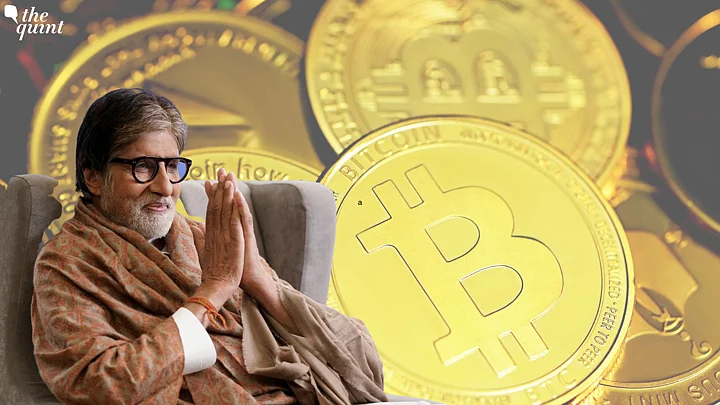Over the past few months, Non Fungible Tokens (NFTs) have gained significant popularity and there seem to be no signs of this trend slowing down anytime soon.
(Want to know more about NFTs, take a quick detour to this in-depth explainer and circle back.)
Fantasy sports enthusiasts – What if there's a way for you to own every player (albeit virtually) you could dream of. What if you could 'invest' in those players' stocks, similar to how consumers invest in traditional stock exchanges, and make a profit out of it as well?
This is now possible through the power of fractionalised NFTs (F-NFTs). The tokenisation of NFTs has now enabled trading of virtually anything in the world – be it art, real estate, a song, a highlights reel or even a meme.
But one of the most popular, and currently hot, applications of this tech is in fantasy sports stock trading.
Sports NFT platforms have racked up nearly $1 billion in funding this week alone. This is proof of how, going forward, F-NFTs can completely change the way fantasy sports are played.
What is Fantasy Sports Stock Trading? Why Does It Matter?
Before we dive into the topic, It is important to understand why people are buying NFTs.
An NFT is a digital certificate of ownership of an artwork, physical or virtual property, a collectible, or literally anything that is ‘one of a kind’. An NFT is transparent and stored on the blockchain, which makes it easy for everyone to see the ‘owner of the token’.
But why are people buying it?
Same reason people own a company's shares. What people buy is the belief and the financial reasoning that the value of the stock will increase over time, as the company does better financially.
Similarly, the main reason to buy an NFT is: financial speculation. the higher the demand (for a share or fractionalised NFT), the higher the price. The only difference being that the NFT's value is based solely on the mass appreciation of it and not its profitability or growth (like for a company).
Combining the power of blockchain and cryptocurrencies (which are used for trading), several companies have created a Fantasy Sports Stock trading platform. The idea is to use blockchain technology to provide users with a marketplace to buy and sell these digital assets.
As per a recent report, titled 'Business of Fantasy Sports' published by the Federation of Indian Fantasy Sports (FIFS) and KPMG, the Indian fantasy sports market is slated to touch $3.7 billion by 2024.
French fantasy gaming NFT startup Sorare has announced that a total of $150 million worth of cards have been traded on its platform since January. This itself shows the craze of fantasy sports trading.
The NFT ecosystem as a whole has also raised significant amounts of funding. Due to this, a rising number of marketplaces have come up that specifically cater to fantasy sports.
But How Does It Function?
The value of the Fantasy Stocks represented by the NFTs increases and decreases based on the players' real-life performance during the real-world games.
For instance, if you're a cricket fan, and Virat Kohli scores a double century, then because of his outstanding performance, more and more people would want ownership of the Kohli stock. On the other hand, people who already own the Kohli stock won't be interested in selling.
What This Means: This shows that since the demand is high, people will be willing to spend more to get hold of the stock, and the subsequent price increase will nudge people who already own the Kohli stock to sell it. As a result, the price of the stock will explode.
Now, let's imagine another scenario, where Kohli gets out in less than 10 runs in two consecutive innings. Due to such poor performances, people who hold Kohli's stock would now want to sell, and not many would be interested to buy.
What This Means: This shows that since the demand is low, people will not spend more on the stock, as a result of which the price of Kohli stock will wane.

Today's top Gainers on TradeStars, a Fantasy Sports Stock trading platform.)
(Photo: Screenshot from TradeStars)
Now, if you see the above picture, Prithvi Shaw is the top gainer on TradeStars, a Fantasy Sports Stock trading platform. Experts suggest that this is after former Aussie spin wizard Brad Hogg called Shaw as India's potential future captain.
This show that NFT sports trading platform works similar to a share market, where trust and public perception is a key factor. But unlike any stock exchange, what it lacks is a regulatory body.
Interestingly, the trade is entirely managed by Smart Contracts on the Blockchain. This means instead of every user fighting over a single Virat Kohli or Prithvi Shaw stock, users can also invest in fractions of these athletes. This, ultimately, increases opportunities to trade on top performers.
How Sports Industry is Exploring NFT?
Fantasy gaming platforms have understood the untapped potential of using trading cards as NFTs to create a virtual sports ecosystem parallel to the one in real life.
The Quint spoke to Toshendra Sharma, founder & CEO, NFTically, an NFT marketplace, to get a deeper look at the use of NFTs as a base to run fantasy sports.
Sharma told The Quint that fantasy sports traditionally revolved around people making their own virtual teams and seeing how they performed on a daily basis.
"They promoted equitably by allowing any player to get chosen repeatedly by any number of teams, which is very different from what happens in real life," he said.
He believes that NFTs coming into play completely disrupts this status quo and brings exclusivity to fantasy sports – making the competition tougher.
Speaking about the potential of NFTs' growth in India, Sharma asserted that the adoption of NFTs in India is bound to witness exponential growth.
"In terms of digital assets, India as a market is at a relatively nascent stage, close to where the US market stood a couple of years ago. The potential of both hype and value addition of non fungible tokens is tremendous in the country," he added.
Regulatory Hurdles
It is worth noting that buying an NFT won't grant you copyright on any digital assets and can be copied ad infinitum.
So, all you get is a link to where the artwork is hosted. When that link goes offline, the digital asset vanished. NFTs are crypto assets, so, they are prone to money laundering. It is even argued that the use of blockchain-based technology, in general, contributes to global warming – as verifying each transaction on blockchain requires a lot of energy.
However, the biggest obstacle in NFT trading is the legal validity of cryptocurrencies in India because, as stated earlier, NFTs are tradeable only in cryptocurrencies.
Cryptocurrencies are not illegal in India, but there are no regulations in place to govern crypto transactions. A matter of concern is also whether India will legalise cryptocurrencies after a Reuters report earlier this year, claimed that India could make crypto transactions illegal.
China, for instance, has just imposed a blanket ban on crypto mining and transactions, Reuters has reported.
Dharmvir Brahmbhatt and Devarsh Shah, students at Gujarat National Law University, say that the legality of NFTs in India is uncertain and adding to the chaos is the belief that trading in NFT is not permitted under the Securities Contract (Regulation) Act, 1956 (“SCRA”).
There is no separate legal framework for NFTs in India. This has led to polarisation among the scholars as to the classification of the NFTs.
As Brahmbhatt and Shah note, in a journal: "Some opine that NFTs are contracts whereas some state NFTs to be a derivative. If the latter is true, in essence, it would mean a ban on trading in NFTs in India."
(At The Quint, we question everything. Play an active role in shaping our journalism by becoming a member today.)



